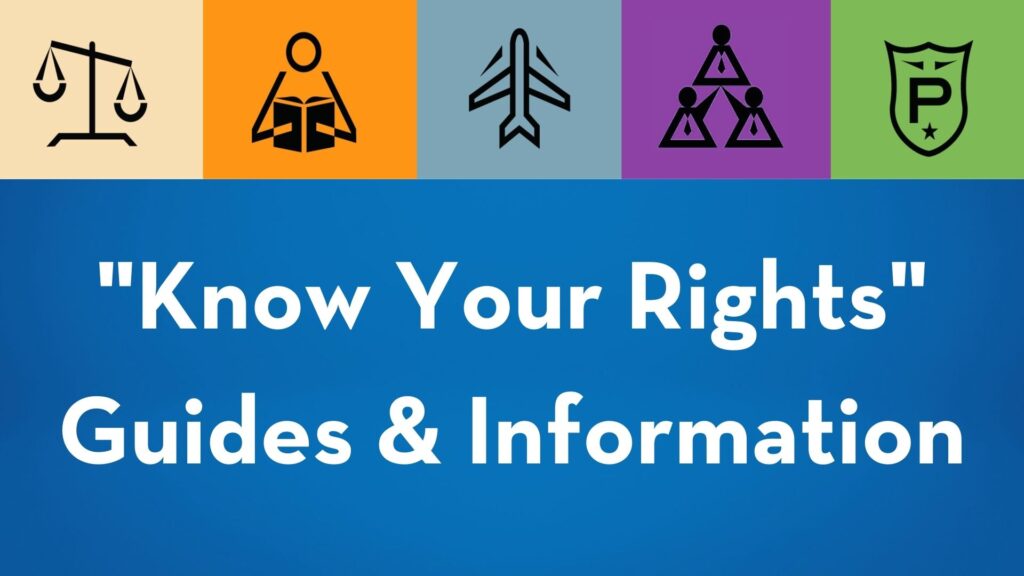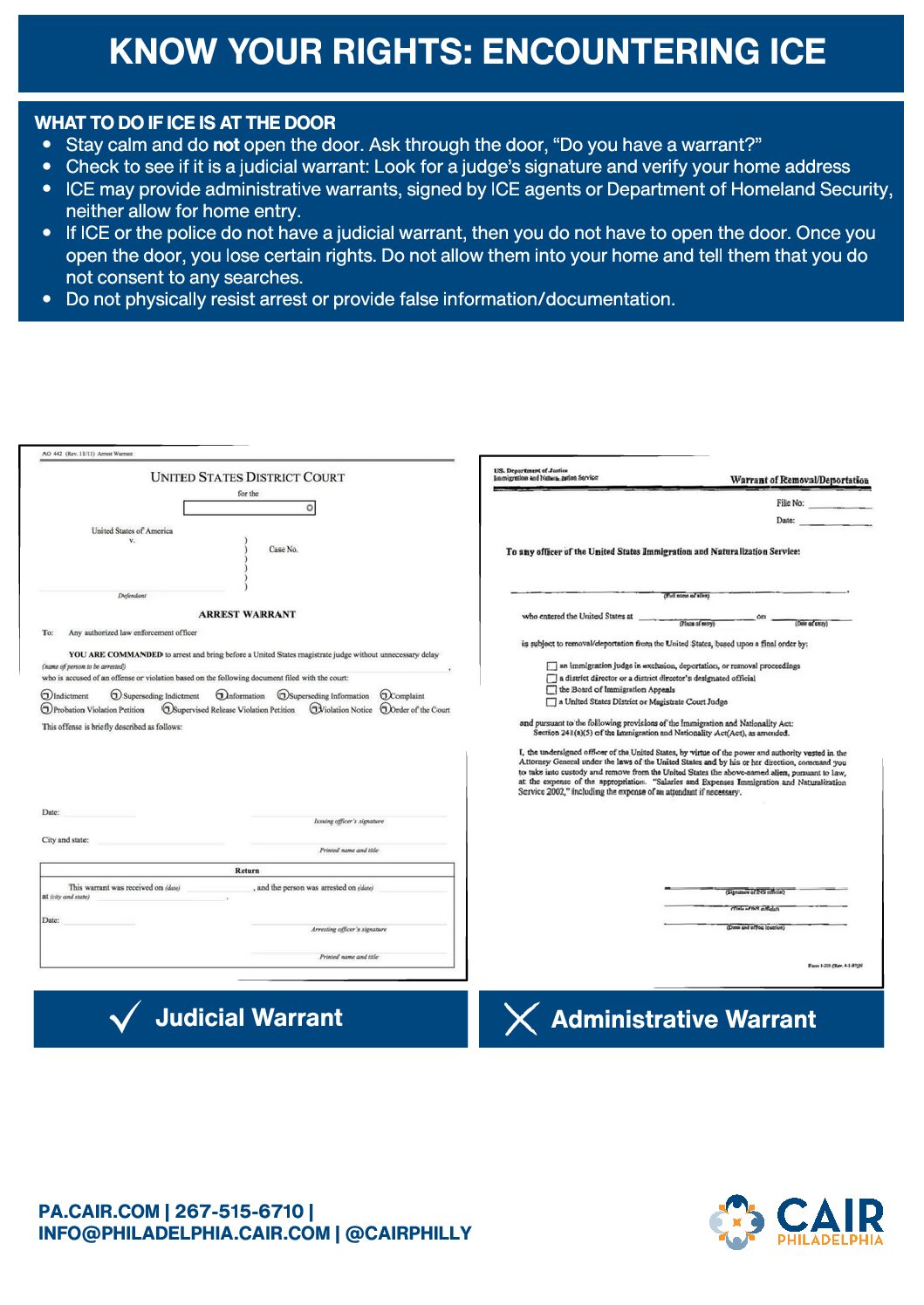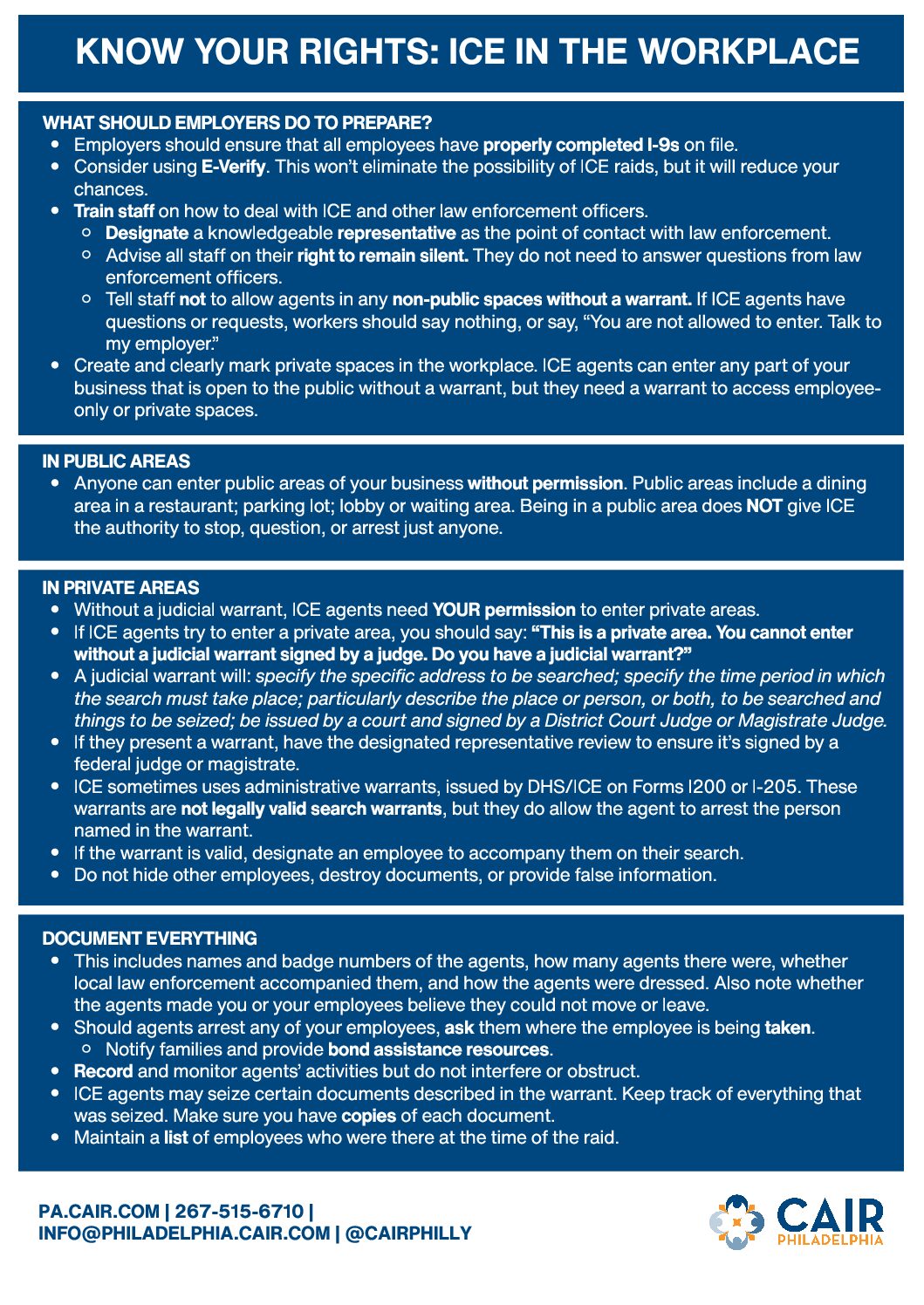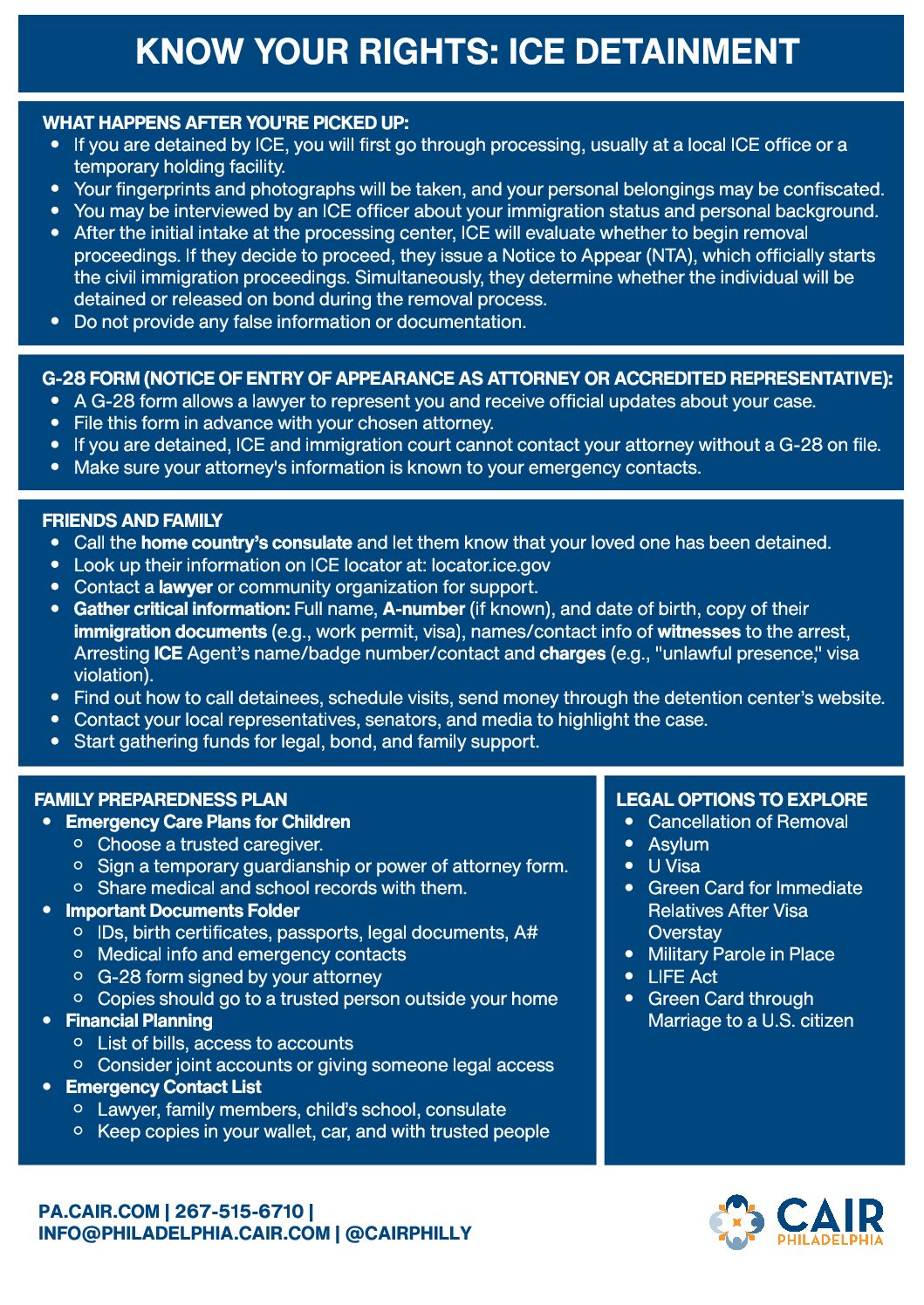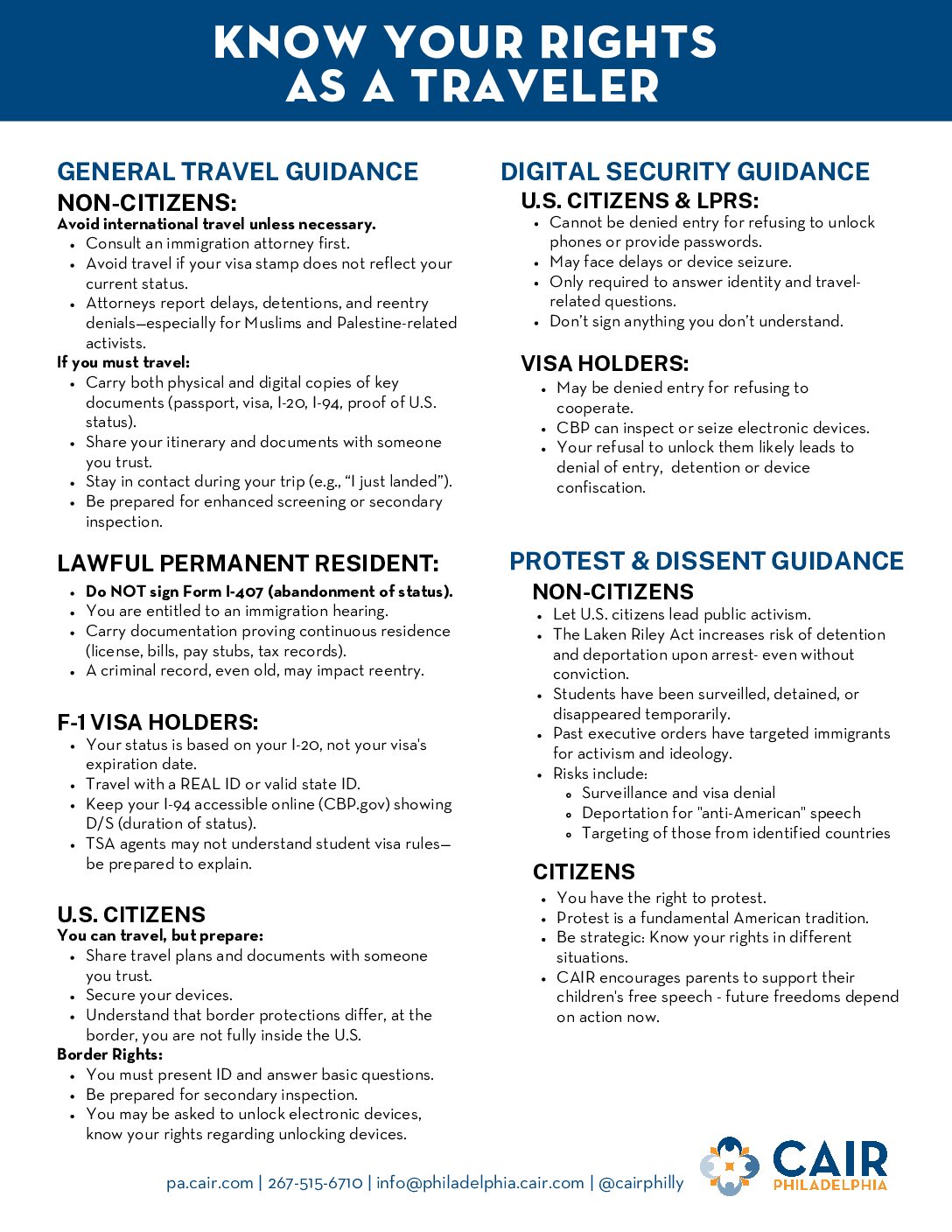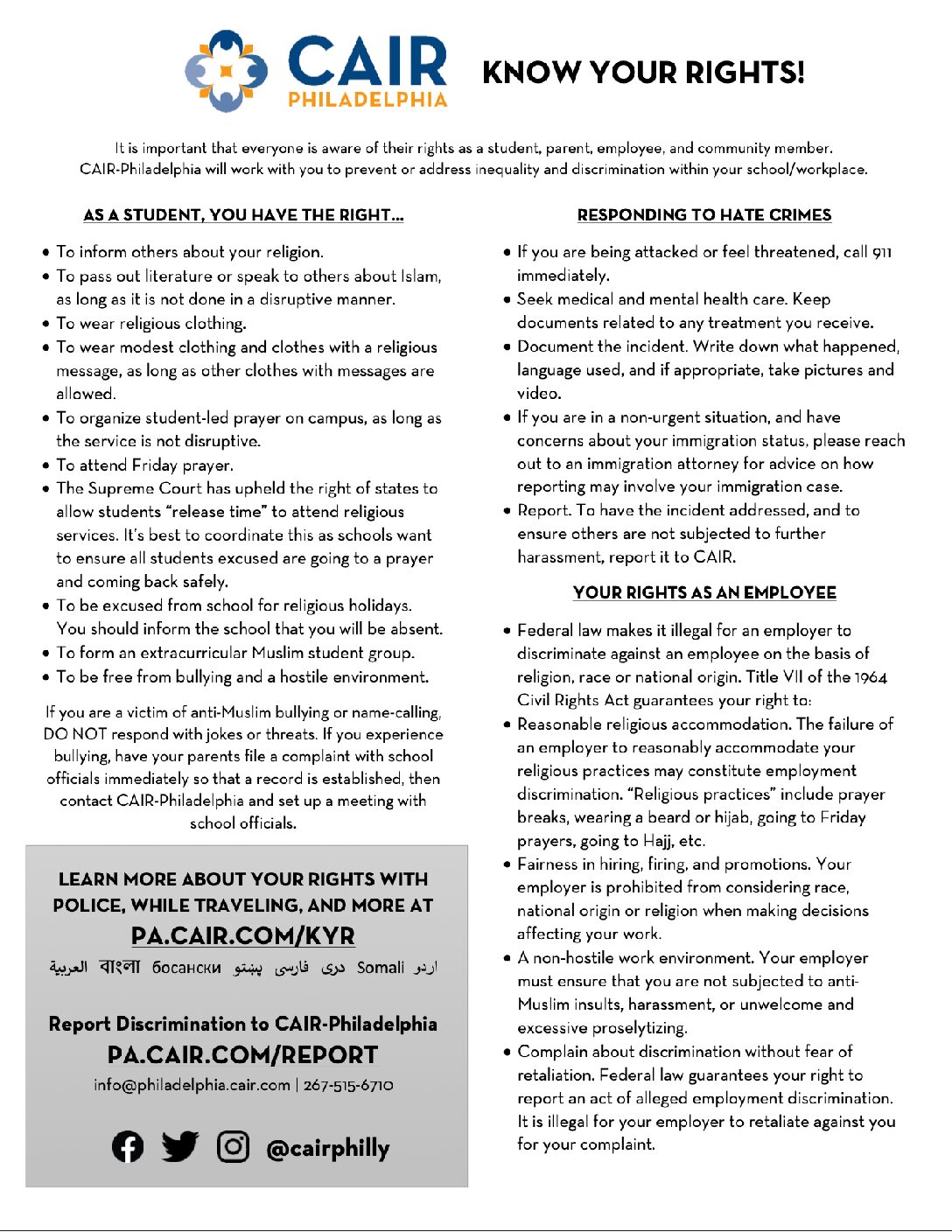Download New Guides:
Know Your Rights with ICE and Travel
Guides & Advisories
The guides below inform American Muslims of our legal rights. These are the same rights all Americans enjoy, but the guides focus on issues Muslims commonly face.
Responding to Hate Crimes
After a hate crime/incident:
- If you are being attacked or feel threatened, call 911 immediately.
- Seek medical and mental health care. Keep documents related to any treatment you receive.
- Document the incident. Write down what happened, language used, and if appropriate, take pictures and video.
- If you are in a non-urgent situation, and have concerns about your immigration status, please reach out to an immigration attorney for advice on how reporting may involve your immigration case.
- Report. To have the incident addressed, and to ensure others are not subjected to further harassment, report it to CAIR.
Your Rights as an Employee
Federal law makes it illegal for an employer to discriminate against an employee on the basis of religion, race or national origin. Title VII of the 1964 Civil Rights Act guarantees your right to:
- Reasonable religious accommodation. The failure of an employer to reasonably accommodate your religious practices may constitute employment discrimination. “Religious practices” include prayer breaks, wearing a beard or hijab, going to Jummah (Friday) prayers, going to Hajj, etc.
- Fairness in hiring, firing, and promotions. Your employer is prohibited from considering race, national origin or religion when making decisions affecting your work.
- A non-hostile work environment. Your employer must ensure that you are not subjected to anti-Muslim insults, harassment or unwelcome and excessive proselytizing.
- Complain about discrimination without fear of retaliation. Federal law guarantees your right to report an act of alleged employment discrimination. It is illegal for your employer to retaliate against you for your complaint.
- Download Accommodation Letter
Your Rights with Law Enforcement
American Muslims strongly support law enforcement and the protection of our national security. As Americans, we also value civil rights. All Americans have the constitutional right to due process and to be politically active.
If you know of any criminal activity taking place in your community, it is both your religious and civic duty to immediately report such activity to local and federal law enforcement agencies.
If you are visited by federal law enforcement agents, remember:
- You have the legal right to have a lawyer present when speaking with federal law enforcement agencies. This is true even if you are not a citizen or have been arrested or detained. This is your legal right. Refusing to answer questions cannot be held against you and does not imply that you have something to hide. Answering a question incorrectly can hurt you more than not answering at all. An attorney is best able to protect your rights.
- You do not have to permit any law enforcement officer to enter your home or office if they do not have warrant. Law enforcement agents must have a search warrant, except in emergency situations, in order to enter your house. If they say they have a warrant, politely ask to see it before allowing them to enter. If they have a warrant, be courteous and polite, but remember that you are under no obligation to answer questions without a lawyer present. You should tell the agents that you do not consent to the search so that they cannot go beyond what the warrant authorizes.
- You should never lie or provide false information to any law enforcement agency. Lying to law enforcement agents under any circumstance is a federal crime.
- Remember to ask any investigator who visits you for a business card so you can give it to your lawyer. At least get the name, contact information and agency of the officer.
If stopped by police:
- On the street: The police must have a specific reason to approach and question you. If you are approached and questioned, the police can pat you down over the outside of your clothing if they have reason to suspect that you are armed and dangerous. You do not have to answer any questions besides identifying who you are and showing a government-issued ID. After the interaction, you will be either free to leave or under arrest. Ask the officer clearly if you are free to leave or if you are under arrest. If you are free to leave, consider just walking away.
- In your car: Keep your hands where they can be seen. If you are driving a vehicle, you must show your license, registration and proof of insurance. You do not have to consent to a search, but police may have legal grounds to search your car anyway. Clearly say that you do not consent to the search. Officers may separate passengers and drivers from each other to question them, but no one has to answer any questions.
- If arrested or taken to a police station: Remember you do not have to talk to any police officer even if you have been arrested or detained. Clearly ask for a lawyer and one phone call until they are provided. If you cannot afford a lawyer, the government has to provide one.
- If mistreated: Do not resist arrest or fight with any police officers. Write down the officer’s name, badge number and any other identifying information. Try to find witnesses and write down their contact information. File a complaint with CAIR as soon after the event as possible.
If contacted by DHS:
The Department of Homeland Security (DHS) includes the U.S. Citizenship and Immigration Services (USCIS), the Bureau of Customs and Border Protection (CBP) and the Bureau of Immigration and Customs Enforcement (ICE).
If you are not a U.S. citizen and are contacted by a DHS official, remember:
- You have the right to an attorney. It is a good idea to carry the contact information of an immigration attorney who can help you.
- Never sign anything without reading, understanding and knowing the consequences of signing it. You have the right to have an attorney visit you if you are in detention and represent you at any immigration hearings.
- Federal law requires you to carry your registration documents with you at all times. Once your immigration status has been shown to an officer, you do not have to answer any other questions without having a lawyer present.
- You should not be asked improper questions. No DHS officer may ask you anything about your religious or political beliefs, groups that you belong to or contribute to, things that you have done or said in the past, or where you have traveled.
Your Rights as a Student
- You have the right to wear religious clothing. You also have the right to wear clothing with a religious message, as long as other clothes with similar messages are allowed.
- You have the right to inform others about your religion. You have the right to pass out literature or to speak to others about Islam, as long as it is not done in a disruptive manner.
- You have the right to organize student-led prayers on campus, as long as the service is not disruptive to the function of the school.
- You have the right to request religious accommodation to attend Friday prayer. The Supreme Court has upheld the right of states to allow students “release time” to attend religious classes or services.
- You have the right to be excused from school for religious holidays. You should be sure to inform the school in advance that you will be absent.
- You have the right to be excused from class discussions or activities that you find religiously objectionable.
- You have the right to form an extracurricular Muslim student group.
- You have the right to express political views as long as you do not cause disruption.
- Download Eid/Ramadan Accommodation Letter
- Download Prayer Accommodation Letter
- Download Class Opt-Out Letter
- Learn more.
Your Rights as an Airline Passenger
As an airline passenger, you are entitled to courteous, respectful and non-stigmatizing treatment by airline and security personnel. It is illegal for law enforcement officials to perform any stops, searches, detentions, or removals based solely on your race, religion, national origin, sex, or ethnicity.
If you believe you have been treated in a discriminatory manner, you should:
- Ask for the names and ID number of all persons involved in the incident. Be sure to write down this information.
- Ask to speak to a supervisor.
- Politely ask if you have been singled out because of your name, looks, dress, race, ethnicity, faith, or national origin.
- Politely ask witnesses to give you their names and contact information.
- Write a statement of facts immediately after the incident. Be sure to include the flight number, the flight date and the name of the airline.
- Contact CAIR to file a report.
It is important to note the following:
- A customs agent has the right to stop, detain and search every person and item.
- Screeners have the authority to conduct a further search of you or your bags.
- A pilot has the right to refuse to fly a passenger if he or she believes the passenger is a threat to the safety of the flight. The pilot’s decision must be reasonable and based on observations, not stereotypes. (Special thanks to the American Civil Liberties Union.)
No-Fly List and Selectee List:
Individuals experiencing difficulties during travel at airports, train stations or U.S. borders may be on either the no-fly or selectee list.
It is very difficult to determine if you are on one of these lists.
You may be on the selectee list if you are unable to use the internet or the airport kiosks for automated check-in and instead have to check in at the ticketing counter. You should eventually be permitted to fly.
The no-fly list, on the other hand, prohibits individuals from flying at all. If you are able to board an airplane, regardless of the amount of questioning or screening, then you are not on the no-fly list.
If you are constantly subjected to advanced screening or are prevented from boarding your flight, you should file a complaint with DHS TRIP: dhs.gov/trip. Most people who file with DHS TRIP are not actually on a watch list and that service can resolve most problems.
Your Rights While Protesting
- Download Detailed PDF Guide
- The First Amendment of the U.S. Constitution guarantees the right to peaceful protest.
- You have the right to protest on public property or government-owned property but beware of restrictions, including permit requirements.
- You have the right to protest on private property if it is your own property or if the owner gives consent.
- When you are lawfully present in a public space, you have the right to photograph anything in plain view. If you are on private property, the owner may set rules about photography or video recordings.
- Police officers may not confiscate or demand to view your photographs or video without a warrant, nor may they delete data under any circumstances. You have the right not to give officers your pin or password to your phone. However, they may order citizens to cease activities that are truly interfering with legitimate law enforcement operations.
- If you are videotaping, be aware that the audio may be treated differently than the visual due to state wire-tapping laws. Be aware of audio recording restrictions in your state.
- The First Amendment does not protect protests that become violent or result in destruction of property.
- You must abide by curfew restrictions.
What to Do if You are Being Detained or Arrested
If police detain you:
- Stay calm. Keep your hands where police can see them. Do not argue, resist, or obstruct the police.
- Calmly tell the police that you are engaging in First Amendment protected activity.
- Ask if you are free to leave. If so, walk away calmly.
- The police may pat you down if they suspect you of carrying weapons.
If police arrest you:
- If police insist on arresting you, you have the right to remain silent and you should remain silent until you have and speak with an attorney. If do not have an attorney, one will be appointed to represent you.
- You may ask the reason for your arrest. You should try to get the name and badge number of the officer arresting you.
- The arrest may be recorded, but you must put your phone or camera down when the police are arresting you.
- You have the right to make a local phone call or call an attorney. Police cannot listen to your phone call with your attorney.
- If you are injured while in police custody, you have the right to medical assistance without delay.
- The police may ask to search your belongings, including your phone. Tell them that you do not consent. They may do it anyway.
- If the police tell you to remove your hijab or kufi, tell them that you wear it for religious purposes and ask why the police is demanding removal. If they force you to remove it, do not resist but tell them that you do not consent.
- If there is a National Lawyers Guild (NLG) observer or other legal observer in proximity, get their attention as soon as practicably possible during or after the police encounter.
Be Prepared:
- Bring identification and/or emergency contact information.
- Use a sign to write a message.
- Have a paper and pen for accurate documenting of events.
- Try to avoid bringing a smart device. However, if you do, turn location services off. Use encryption services. Disable biometric sign-in (fingerprint and facial recognition) on your device before going to any protest. You may keep numerical passwords. You have the right not to provide your password to the police.
- Pack a backpack of essentials and emergency supplies including identification document and/or emergency contact information, water, snack, several days of prescription drugs, wet wipes and tissues, and other essential supplies.
- Park away from the protest site or at a friend’s house and travel by metro, bus, or foot.
- Wear a mask to protect yourself and others from COVID-19 and try your best to adhere to social distancing rules.
Immigrant Rights:
- Everyone living in the United States has the right to peaceful protest.
- If you are stopped by an officer, you have the right to remain silent. You do not need to tell the officer your immigration status.
- You may not lie or provide false documents. You may refuse to show identification documents.
- You may refuse a search if you are stopped but not arrested. The officer may still pat you down if they suspect you are carrying a weapon.
- You have the right to speak with a lawyer if you are arrested and police cannot listen to your conversation with your lawyer.
- You should not sign any documents until you have a lawyer with you.
Your Right to Wear Hijab/Khimar
- In public schools, students are guaranteed the right to wear hijab pursuant to the First Amendment. You cannot be harassed or discriminated against for wearing hijab.
- In private schools, students’ ability to wear hijab may be limited, but doing so may constitute religious discrimination.
- In public spaces (public accommodation), all people are guaranteed the right to freely practice their religion in public spaces, including wearing the hijab (at parks, public transportation, stores, government buildings, and other public venues, etc.).
- During encounters with law enforcement, law enforcement officers (including correctional officers) cannot force the removal of the hijab unless there is a compelling reason, such as a legitimate security concern.
- Prisons must accommodate religious clothing for incarcerated individuals unless it poses a legitimate security threat.
- Individuals are only required to remove their hijab in rare circumstances.
- Any situations that require the removal of someone’s hijab should be limited and done in a manner that respects the individual’s religious and privacy rights.
- Report incidents of hijab removal to our office at: pa.cair.com/report and your information will be reviewed by our legal team.
Download Guides in Other Languages
Arabic: اعرف حقوقك كمسافر | اعرف حقوقك مع موظفي انفاذ القانون | اعرف حقوقك كطالب | اعرف حقوقك كموظف | تعامل مع جرائم الكراهية
Bengali | বাংলা: Travel | Police/FBI | Student | Employee | Hate Crimes
Bosnian | босански: Travel | Police/FBI | Student | Employee | Hate Crimes
Dari | دری: Travel | Police/FBI | Student | Employee | Hate Crimes
Farsi | فارسی: Travel | Police/FBI | Student | Employee | Hate Crimes
Pashto | پښتو: Travel | Police/FBI | Student | Employee | Hate Crimes
Somali: Travel | Police/FBI | Student | Employee | Hate Crimes
Urdu | اُردُو: Travel | Police/FBI | Student | Employee | Hate Crimes


